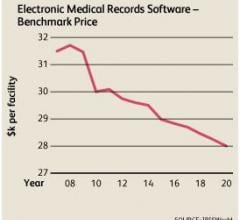December 3, 2009 – Vendor readiness, lack of staff and access to capital will make implementation of the HIT Standards Committee standards in time to meet currently established deadlines unlikely, say most Healthcare CIOs.
The College of Healthcare Information Management Executives (CHIME) conducted a recent survey, which drew 176 responses from Healthcare CIOs. The interviewees worry they will not be able to implement standards, such as establishing “meaningful use” of healthcare data in an EHR.
The HIT (Healthcare Information Technology) Standards Committee recommended roughly 20 standards for the electronic exchange of health information. Implementing applications that use those standards are expected to impact health organizations’ chances of qualifying for stimulus payments based on achieving the meaningful use of EHR.
Nearly two-thirds of all respondents said they were at least somewhat worried about their ability to implement standards-based applications and how that would affect meaningful use determinations for their organizations. Only 8.3 percent said they were not worried about achieving deadlines. Some 37.3 percent of respondents said they were either very concerned or worried about meeting deadlines for implementing standards; 27.8 percent said they were somewhat worried; 26.6 percent said they were a little worried.
“Early attempts at standardization were not rousing successes,” said David Muntz, senior vice president and CIO at Baylor Health Care System in Dallas. “It’s hard to believe that we will be able to adapt to new standards in time to qualify for the rewards from the stimulus. I’m hopeful we’ll be there before the penalties are levied.”
There was significant concern that healthcare IT application vendors will not be ready to offer standards-based products that will enable providers to meet the deadline; 21.6 percent of all respondents listed vendor readiness as their top concern.
The need to implement upgraded or new systems in order to comply was mentioned as the top concern by 14.8 percent of all respondents. Also mentioned as the top impediments were insufficient capital, 15.3 percent; lacking staff with needed skill sets, 10.2 percent; and insufficient staff, 8.5 percent.
Pam McNutt, senior vice president and CIO for Dallas-based Methodist Health System noted that for organizations with clinical documentation already in place will have to retool nomenclature to map to the standard’s nomenclature.
SNOMED CT, the standard designated for clinical problems and procedures, is the most widely deployed vocabulary standard, with 51.1 percent of respondents reporting that their systems can support the nomenclature. LOINC, the standard vocabulary for laboratory tests, is supported by systems at the organizations of 40.5 percent of respondents, while 43.9 percent said LOINC is not supported by their IT systems.
Other vocabulary standards have much less penetration. For example, 59 percent of respondents said their systems don’t support RxNorm, the proposed standard for drug and medication allergies, while 51.7 percent of respondents said their systems don’t support UCUM, the proposed standard for units of measure, and 55.8 percent said their systems don’t support UNII, an ingredient allergies standard.
In terms of content standards, providers’ answers suggest they are not as far along in implementing systems that are based on newer standards. For example, 51.2 percent of respondents said the systems of their organizations support HL7 v2.5.1 for clinical messaging, but fewer than 25 percent can support NCPDP and HL7 standards for pharmacy order content.
For more information: www.chime.org


 June 14, 2024
June 14, 2024 









